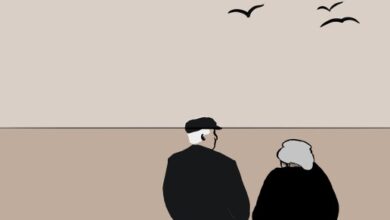
A Roadside Stand by Robert Frost is a poem deals with the consequences of urbanization, and the impacts on those that live in the countryside. It shows a clear picture of the rich versus the poor and the dependence that the poor have on the charity of the rich. However, the poem also represents the uncaring nature of the city-dwellers, and the struggles thus faced by the people living in less urbanized areas. Birches is another brilliant poem by Frost, the analysis of which may be read here.
A Roadside Stand | Summary And Analysis
A Roadside Stand | Analysis, Lines 1-6
The little old house was out with a little new shed
In front at the edge of the road where the traffic sped,
A roadside stand that too pathetically pled,
It would not be fair to say for a dole of bread,
But for some of the money, the cash, whose flow supports
The flower of cities from sinking and withering faint.
The poem begins with a description of the scene that the poet sees. He sees the country house start a new roadside stand, situating it right near the road so that it is visible to the people that drive by. This stand was small, and it was set up in order to gain some kind of profit. It would be unfair to assume that the stand was set up for charity, as a “dole of bread” is referring to donations or an unemployment allowance. The stand asks for money that usually goes toward the development of cities, to instead support the development of the countryside.
The “flower of cities” juxtaposes the characteristic of the natural countryside with the industrial city. This flower that requires care and support for its growth is used as a metaphor for the development of industry and urbanization. Nature, which was highly valued before industrialization, now plays a secondary role to the growth of the city.
Here, contrast is used in the very first line “The little old house…a little new shed”. This shows that the house had been there for a long time and can mean that the shed is either brand-new or refurbished. According to the context of the poem, we can see that the shed would be brand new, as the farmers are forced to find new sources of revenue and turn to selling their produce using roadside stands.
Alliteration is used in “pathetically pled”
A Roadside Stand Analysis, Lines 7-15
The polished traffic passed with a mind ahead,
Or if ever aside a moment, then out of sorts
At having the landscape marred with the artless paint
Of signs that with N turned wrong and S turned wrong
Offered for sale wild berries in wooden quarts,
Or crook-necked golden squash with silver warts,
Or beauty rest in a beautiful mountain scene,
You have the money, but if you want to be mean,
Why keep your money (this crossly) and go along.
Outside, on the road, the traffic was “polished”, which reveals that the cars that pass are high-class, and belonging to the relatively rich. They pass by intending to go somewhere else and do not desire to stop and pay attention to the stalls on their way. However, when they do pay attention to what is around them, it is not with gratitude or acceptance. Instead, they lament how the scenery is ruined by these roadside stands, and see the old, battered signs. They criticize without remorse, as they do not think about the people who cannot afford to fix their signs and ignore the product set up for sale.
The farmers sell their berries, their vegetables, and fruits, and in some cases, their art. They do whatever they can to find sources of revenue, and this combined with the deteriorating signs show that the people are reaching a state of desperation. The rich that pass by have the money to spend on these little things but are more miserly than forthcoming.
The interjection of “(this crossly)” shows that the responses of the rich that drive by lack any sort of elegance and politeness. In fact, they are outright rude, as they place more value on the beauty of the scenery than the livelihood of the people who live there. This is hypocrisy, as the industrial cities destroy nature in order to grow, and thus they have no basis to lament about a slight break in the beauty of the countryside.
A Roadside Stand | Analysis, Lines 16-31
The hurt to the scenery wouldn’t be my complaint
So much as the trusting sorrow of what is unsaid:
Here far from the city we make our roadside stand
And ask for some city money to feel in hand
To try if it will not make our being expand,
And give us the life of the moving-pictures’ promise
That the party in power is said to be keeping from us.
It is in the news that all these pitiful kin
Are to be bought out and mercifully gathered in
To live in villages, next to the theatre and the store,
Where they won’t have to think for themselves anymore,
While greedy good-doers, beneficent beasts of prey,
Swarm over their lives enforcing benefits
That are calculated to soothe them out of their wits,
And by teaching them how to sleep they sleep all day,
Destroy their sleeping at night the ancient way.
The poet who watches all of this unfold does not bemoan the lack of scenery but instead thinks about the situation of those who are forced to depend on these roadside stands, and their sorrows. They live far away from the clusters of people in the city and set up a stall to earn some money. They ask simply to feel a connection with the rest of the world, for some “city money to feel in hand”. This money that can be so easily given by those that pass by will make a significant impact on the lives of the sellers and let them dream about the kind of lives that are shown in movies. They have heard that the powerful people, the ones who represent the cities and make the decisions, are sidelining the farmers knowingly. This sort of life is kept from them, and all the sellers have are dreams and promises for a more comfortable, luxurious life.
The farmers realize that all these people are gathered together in one place, and live lives that take all thinking out of the equation. The farmers refer to these people as “pitiful kin” because, though they may have more physically comfortable lives, it slowly saps away their mental acuity. They live in places where everything is easily accessible, and this again is a condemnation of urbanization from the side of the poet. All the benefits of this modernized world involve removing the man from humanity and replacing it with a mindless being.
Alliteration is used in “greedy good-doers” and “beneficent beasts”.
A Roadside Stand | Analysis, Lines 32-43
Sometimes I feel myself I can hardly bear
The thought of so much childish longing in vain,
The sadness that lurks near the open window there,
That waits all day in almost open prayer
For the squeal of brakes, the sound of a stopping car,
Of all the thousand selfish cars that pass,
Just one to inquire what a farmer’s prices are.
And one did stop, but only to plow up grass
In using the yard to back and turn around;
And another to ask the way to where it was bound;
And another to ask could they sell it a gallon of gas
They couldn’t (this crossly); they had none, didn’t it see?
In these lines, the poet directly sympathizes with the farmer, putting himself in their shoes. The poet cannot even handle the thought of living a life of such deep longing, knowing that the yearning will never be fulfilled. This yearning is for recognition, for a feeling of accomplishment and the relief of earning the day’s bread.
The farmers spend all day with eyes and ears perked, waiting for the car that stops to buy something, praying for a sale and some profit. Still, the cars that pass spare nothing, and are “selfish”. They think only of themselves, and thus, all their stops are for self-serving reasons. The farmer wants a car to stop and at least ask the prices of his goods, but the cars that stop do so to use the space to make a turn or ask for directions. Some do ask for goods, but not goods that the farmer sells. They ask for fuel when it is clear that the farmer sells none. Day in and day out, it is a charade that the farmer is forced to participate in, always hoping for that one car that stops for a good reason, to buy his produce.
Here, again, “(this crossly)” is repeated as an interjection, but in this case, it is in reference to the sellers. Their anger is in response to the nonsensical requests made of them and the total ignorance of their actual produce. The rich do not care for them, and the poor feel this anger as a reaction to it. A place that sells berries clearly does not sell fuel, and it is crazy to even ask for such a silly thing. These infuriating experiences lead the farmer to feel cross.
Alliteration is used in “sound of a stopping car”.
Anaphora is used in the repetition of “And another” in lines 41 and 42, which emphasizes the fact that these frustrations are never-ending, and all these cars still do not spend any of their money to buy the goods that are actually available.
A Roadside Stand | Analysis, Lines 44-51
No, in country money, the country scale of gain,
The requisite lift of spirit has never been found,
Or so the voice of the country seems to complain,
I can’t help owning the great relief it would be
To put these people at one stroke out of their pain.
And then next day as I come back into the sane,
I wonder how I should like you to come to me
And offer to put me gently out of my pain.
The countryside, in reality, never earned the profits that they needed nor deserved. They never felt the strong connection between them and the faraway cities, and their spirits remained dampened and alone. The poet felt as though he could hear the countryside making this complaint loud and clear, saying that they have not been able to achieve what is really needed. The poor are left to get poorer, while the rich pass by in their comfort.
Knowing this, the poet wonders whether it would be better to take all these people out of their tangible misery and give them eternal relief from the suffering of the world. In essence, he wonders whether mercy-killing was ethical in this situation and whether this painless process would benefit them far more than the pain they feel every day of their lives. However, after some proper thought, he again puts himself in the same situation. He asks a profound question of himself, whether he would appreciate being taken out of this world by someone else. He wonders what he would think if someone offered to painlessly kill him. The poem ends with this question left open, prompting the reader to think of it themselves. The tone, however, portrays a feeling of pity, and the knowledge that such an offer would not be appreciated, as life is more valuable than a release from suffering to him.
A Roadside Stand | About The Poet
One of the most beloved American poets of the 20th century, was born on 26 March 1874 in San Francisco, California. His father was a journalist whose untimely death due to tuberculosis left the family in a financial catastrophe. A high performing student in his class, Frost shared the high school valedictorian honors with a certain Elinor White. Naturally, the two brightest people in the class fell in love and Frost proposed her following the publication of his first poem My Butterfly: An Elegy. The two married in 1893 and Frost resorted to teaching and farming in order to support the family. Frost studied at Dartmouth College and Harvard University at various points in his life but voluntarily left both institutions without a degree.
Frost was a literary nobody for almost forty years of his life. His first book of poems finally found an accepting publisher in 1913 and that too after he moved to England. A Boy’s Will was published in 1913 which introduced Frost to the English literary scene. Ezra Pound was among the first poets to recognise Frost’s genius and his favourable review of his poems hastened his success. By the time he returned to the U.S following the outbreak of World War I, Frost had become a celebrity figure in the literary circle. He received four Pulitzer Prize for poetry, over forty honorary degrees and was nominated for the Nobel Prize thirty one times. Frost recited his poem “The Gift Outright” for President John F. Kennedy’s inauguration and was even sent to the Soviet Union during the Cold War (as an unofficial ambassador) where he met Nikita Khrushchev shortly before the Cuban Missile crisis.
Robert Frost was a master at turning everyday moments of ordinary experience into treasures of insight and discovery. His representation of the rural settings of New England and his depiction of man’s everyday encounter with nature often resulted in philosophical ruminations on the different dimensions of the human condition. His masterful handling of everyday speech patterns along with adherence to traditional rhyme schemes often depict the subtle balance between the old and the new, tradition and innovation, which is seen in most of his works. Famous for likening free verse poetry to “playing a tennis game without net”, he was of the view that there are “old ways of doing new things”. His knack of effectively employing colloquial language, his brilliance in exploiting simple situations to analyze complex social realities and philosophical themes, his economy of words and his sheer capacity to expound have endeared him to swathes of readers who delight in his works to this day
Frost died on January 29th 1963 owing to complications arising from a prostate surgery.


